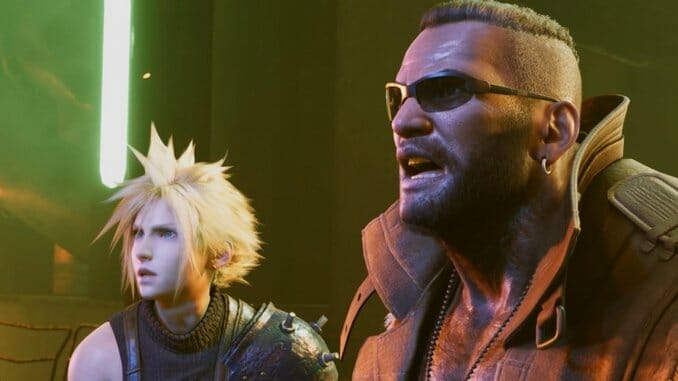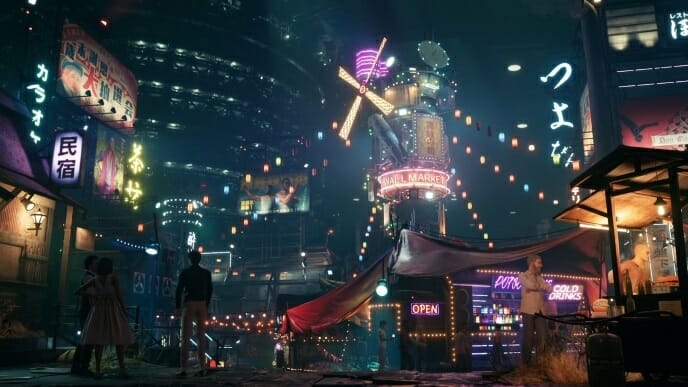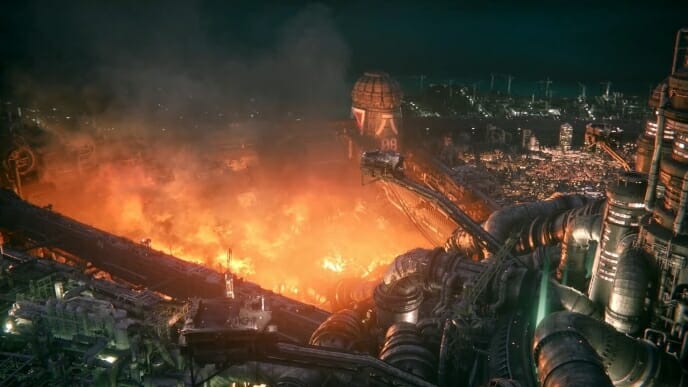Neo-Midgar and Neoliberalism: The Myth of an Apolitical Game in Final Fantasy VII Remake

Early on in Final Fantasy VII Remake, a man who lives in the shantytown slums under the hyper-developed city of Midgar rips an Avalanche poster off a communal bulletin board. “Goddamn eco-warriors with their dumbass posters,” he says. He looks up to the sky (or lack thereof, as the massive plate that houses the upper class looms overhead, blocking the sun) and muses, “Look at all that steelwork. You’re trying to tell me that’s not progress?”
This man lives in one of the poorest communities on the planet. Why does he feel the need to defend the honor of Shinra, a company that’s consigned him and hundreds of others to hovels and lives of petty crime? It probably has to do with the empty promise Shinra makes to all of Midgar’s citizens.
You hear it in nearly every sector among the ambient dialogue of passerbys. Some debate whether they want to go topside for contract work, insecure jobs that pay a middling wage and are typically quite dangerous. Others wonder why they haven’t struck it rich after moving from the idyllic, low-tech countrysides that reside outside of Midgar’s borders in Gaia, the planet that serves as the setting for Final Fantasy VII, and which was, until recently, a typical JRPG fantasy world, complete with monsters and Western-style mid-millennia villages.
FFVIIR is a rephrasing of the original FFVII, indicated right there in the name—Remake—and is concerned just as much with its story changes as it is the metanarrative surrounding the game. FFVIIR is often in conversation with the neoliberal ideas that have hovered around it for the last 20 years, in which free market apologists continue to deride fans who saw the original as a radical critique on globalization and the private sector.
Early on, these apologists may have rejoiced given leaks and snippets indicating a less extreme interpretation of Avalanche, a purposeful choice made by Square-Enix that sparked conversation on the original game’s true intentions and whether the original story’s depiction of direct and violent action was appropriate for a post-War on Terror audience. This was a calculated decision based on the game’s later content, which often calls out the sort of weak-kneed takes centrists have on progressivism in media.

Oppression on Gaia works (quite literally) in a vertical manner—drawing on Norse mythology’s penchant for realms stacked atop one another, Midgar’s high society lies on plates suspended in midair by pillars, with the poverty line demarcated via altitude. You see this all across the original FF7. The Gold Saucer, a gilded casino, floats gaily above a dilapidated coal town refashioned into a labor camp. The military base Junon is similarly built top-down.
FFVIIR cleverly iterates on this idea, particularly after the sector 7 plate falls. There’s a chapter dedicated to climbing the rubble where you hear the cries of those living topside, the supposed elite of Midgar. The misery of those people, supposedly better off and protected by Shinra, is showcased plainly. It serves as an equalizer, a visual for the even playing ground the citizens of Midgar operate on. Whether on top or bottom, you’ll be crushed when it all falls to pieces.
Ultimately, the neoliberal dream Shinra offers isn’t sustainable. It’s impossible to maintain an idea of “unity” or togetherness while engendering a cutthroat world of low social mobility. Despite this, the people of Midgar keep these hazy ideals close to their hearts. Early in the game, Barret challenges some Shinra employees gabbing on a subway train about Avalanche’s threat to Midgar. Visibly afraid, the trio—identified by the subtitles as “middle managers”—deflect Barret’s arguments with platitudes. “We will not submit to intimidation or violence,” they say. “But work together for peace and prosperity. That is how civilized people change the world.” They clap, proud to uphold Shinra’s “creed.”
Barret’s approach was nonviolent, and given his track record, he wouldn’t harm an unarmed citizen. His only point of intimidation is his appearance and sympathy for Avalanche’s goals. They run away, the female employee in tears. Cloud, happily apolitical, tells Barret he should leave Midgar if he’s so unsatisfied—a version of the “love it or leave it” mentality. “The folks down there don’t have the luxury of choice,” Barret says.
It’s heartening to see that FF7R doubles down on its own radical history. Fans across the ages have referred to FF7’s anti-capitalist themes as incidental at best, bemoaning the supposed need to make videogames political. Throughout the game, Barret slaps those fans across the face—apolitical thought is a privilege, one that FF7R doesn’t revel in. If an Avalanche member armed with an assault rifle mowing down “fascist pricks” isn’t enough to convince you of the writers’ intent, I’m not sure what will.
Once the plate falls, a conspiracy about Wutai’s funding of Avalanche’s actions reaches a fever pitch. An older woman on the streets of sector 5’s slums bemoans that Midgar wants to move on but “Wutai won’t let us.” Barret wants to call it out, but Tifa stops him—”There’s no point in even trying.” It’s a common tactic we see in our own world, pinning domestic issues on foreign influences, and it’s near-impossible to blow back against. Avalanche is composed of JRPG heroes. They could slay a thousand cerulean drakes and destroy all eight reactors without breaking a sweat. Changing the opinions of the public is the real challenge.

Tifa’s opinions on Avalanche are perhaps the most significant alteration to any of the main cast’s characterizations. I was initially disappointed she wasn’t so gungho on direct action, but she offers an interesting nuance to Avalanche’s ideology. In FFVIIR, we see how Tifa has become a fixture of her community, installing water filters for her neighbors and assisting Cloud with finding work and an apartment. Her reluctance to shake the boat is understandable because she sees fighting Shinra as a losing game, a universal fact that the group should make the best of.
Tifa serves as an excellent foil to Barret. In one of the game’s most emotional moments, Tifa grows to blame herself for the plate’s falling. Barret, despondent, reassures her “it was Shinra that pulled the trigger.” Nevertheless, Tifa continues to grapple with her guilt on the loss of sector 7. She had managed to find a place for herself on the fringes of Midgar’s outskirts and, once she expressed unrest, it was destroyed in a flash.
Aerith’s mother, Elmyra, shares a similar sentiment—she begs the party not to chase after Aerith once she’s kidnapped. “I’m sure she’s still being treated like a guest. They’ll send her back home once they get what they need,” she says. In a neoliberal world, civil disobedience is a gateway to a worse world, an opening for punishment for attempted insurrection, and, honestly, it’s difficult not to sympathize with Elmyra’s point of view.
Midgar’s false promise of freedom (or, for the poor, a stagnant form of normalcy) makes it feel more alive than ever, more understandable why anyone would choose to live there when there’s a whole world outside its walls, some regions not yet despoiled by Shinra’s embrace. Gaia was, until recently, a typical JRPG fantasy world. With blossoming progress comes exploitation, and Shinra promises a better life than what the idyllic countryside can provide. It’s why no one leaves the city. A mythic idea of inclusivity, the kind where anyone can find success, binds Midgar’s wayward citizens. It’s a society of contrast—it’s more advanced than the outside world, a city upon a hill threatened by foreign deriders. They’re expansionists, too, preaching an untenable right to settling the alleged “Promised Land” of the ancients and fashioning a new, bigger “Neo-Midgar,” all in the name of society’s apparent advancement. It all echoes the sort of thinly veiled colonialism we deal with every day from America’s right and, increasingly, the center as well, from pipelines to predatory Amazon campuses.
Final Fantasy VII was one of my first encounters with the ideas of class consciousness and leftist thought. It was baffling to see a game centered on eco-terrorists, to view destructive or violent actions as noble when many of its peers offered shallow or even nationalist takes on good versus evil. No matter its flaws, Final Fantasy VII Remake has its heart in the right place and wants to be more relevant than ever before. Without saying too much (it really should be experienced firsthand), the game’s ending paints as big a picture as possible for Square-Enix’s commitment to justice—defying fate and forging a new destiny is far more radical than accepting the world you live in, the events that are supposed to unfold. Leftists will always operate on the periphery, it reminds us.
Austin Jones is an intern at Paste. He writes about music, videogames and queer issues. He’s an avid fan of electronic and pop music, horror games, Joanna Newsom and ’80s-’90s anime. You can follow him on Twitter @belfryfire.







































